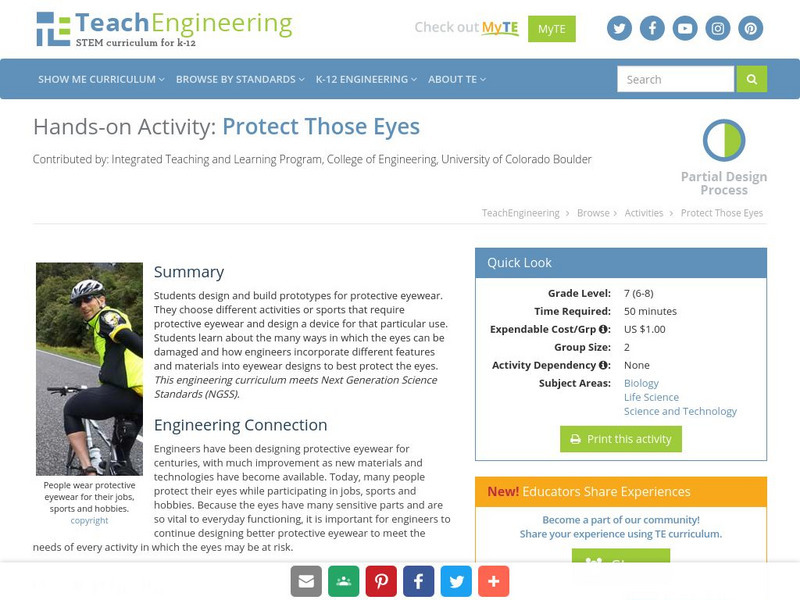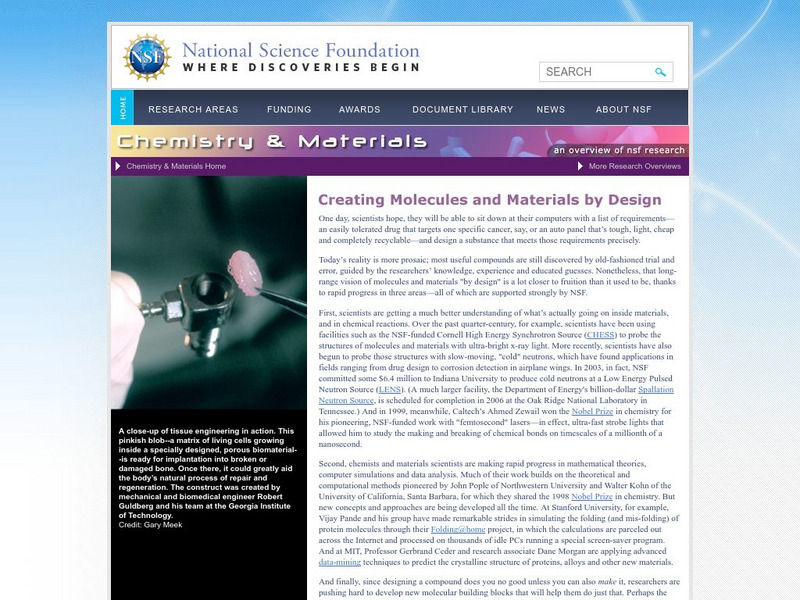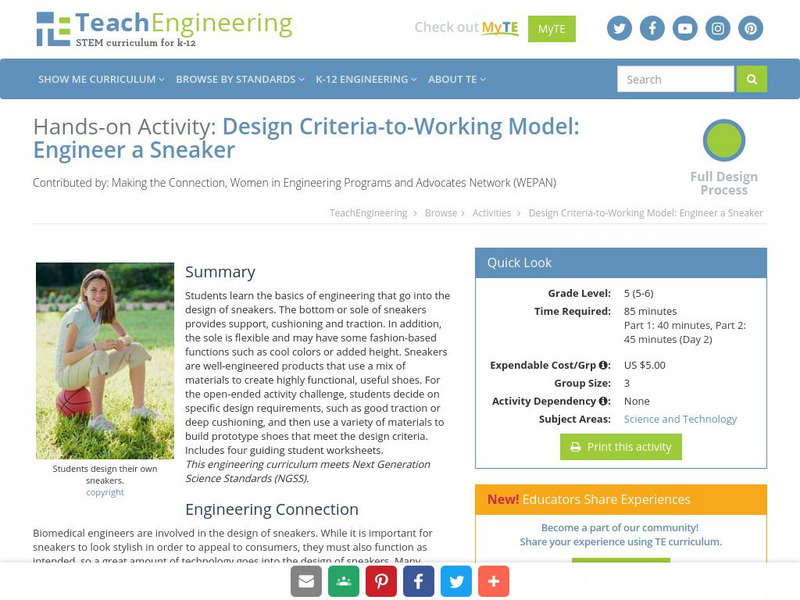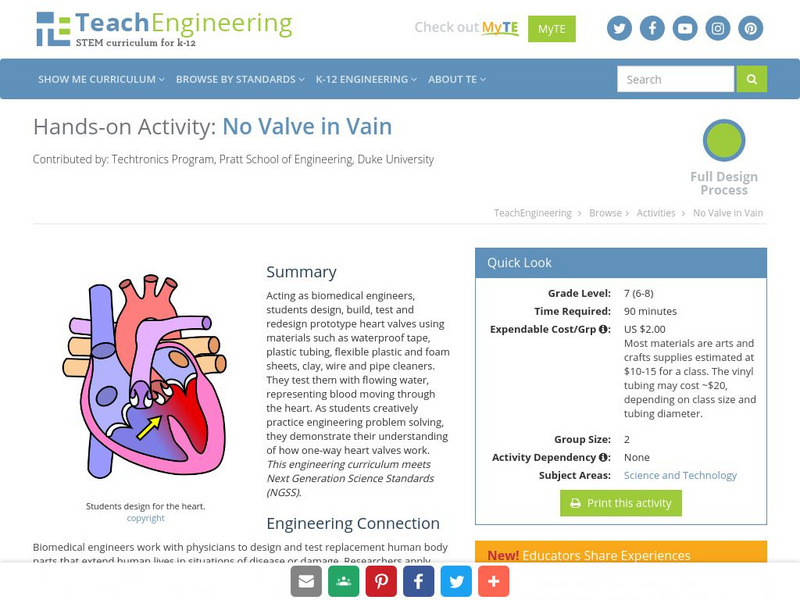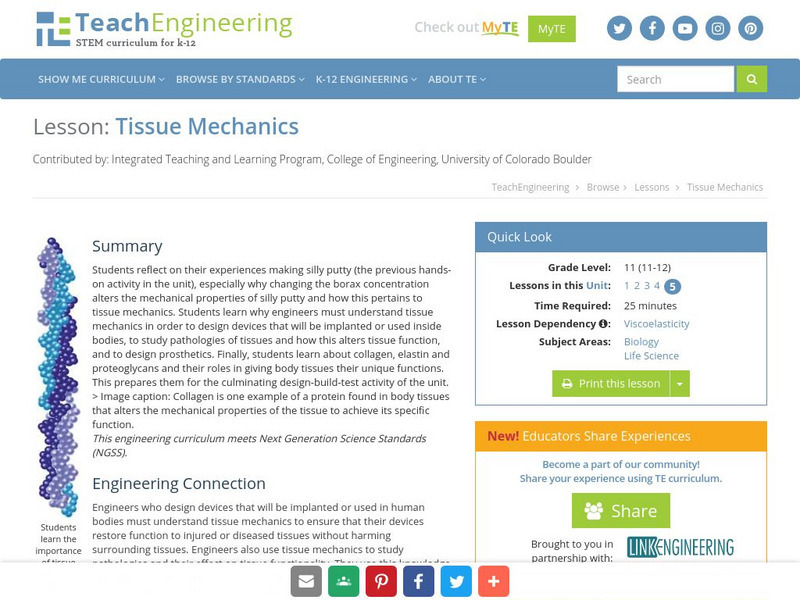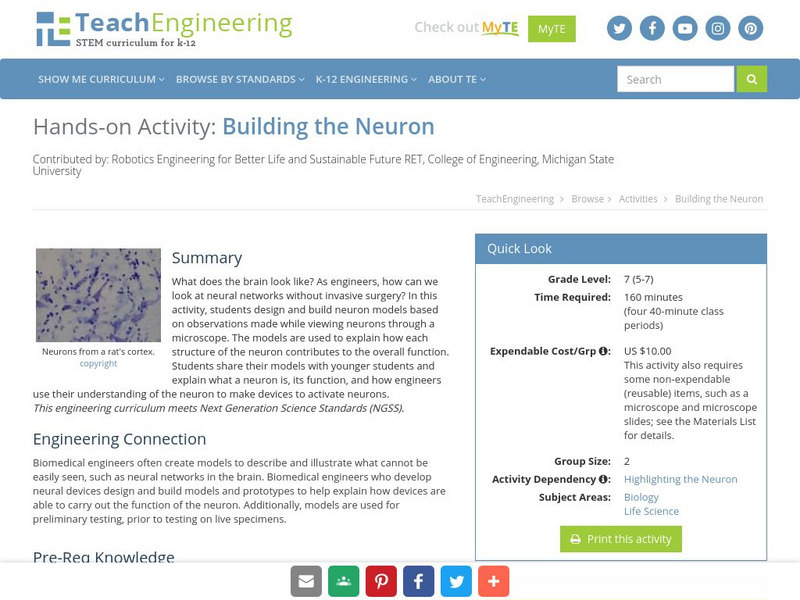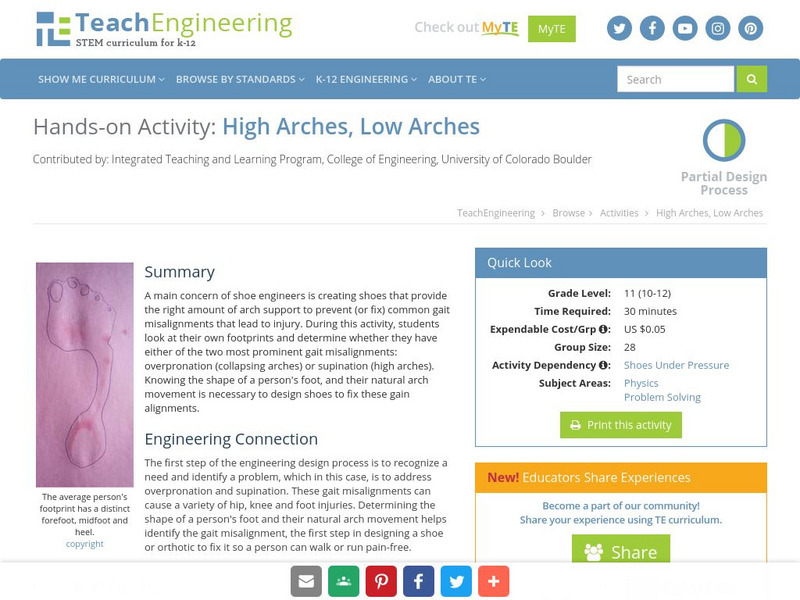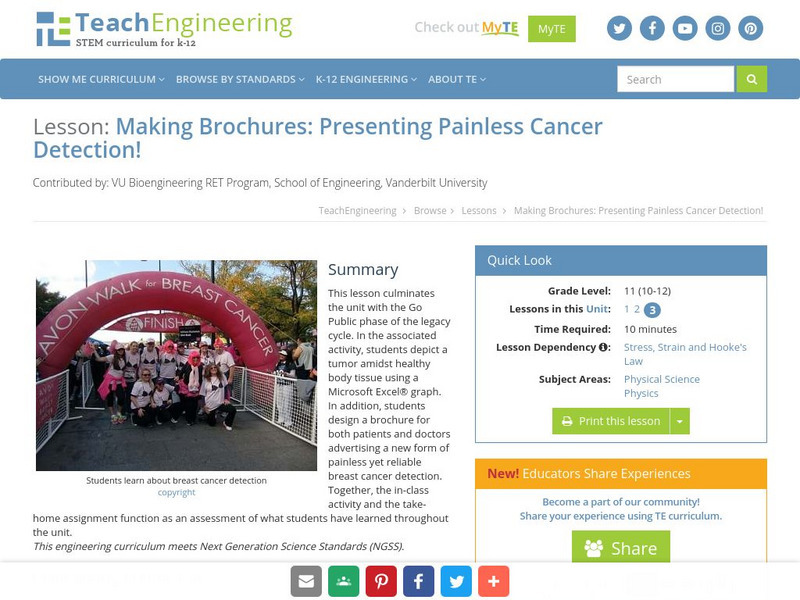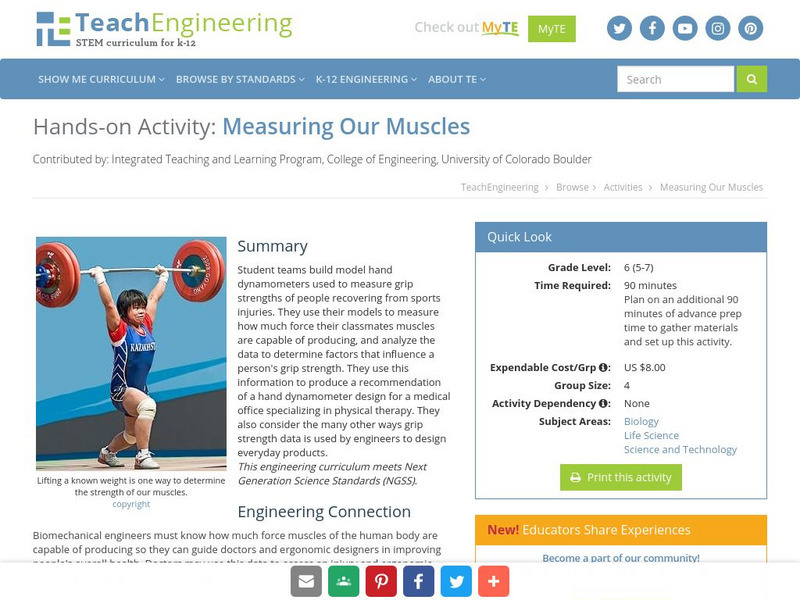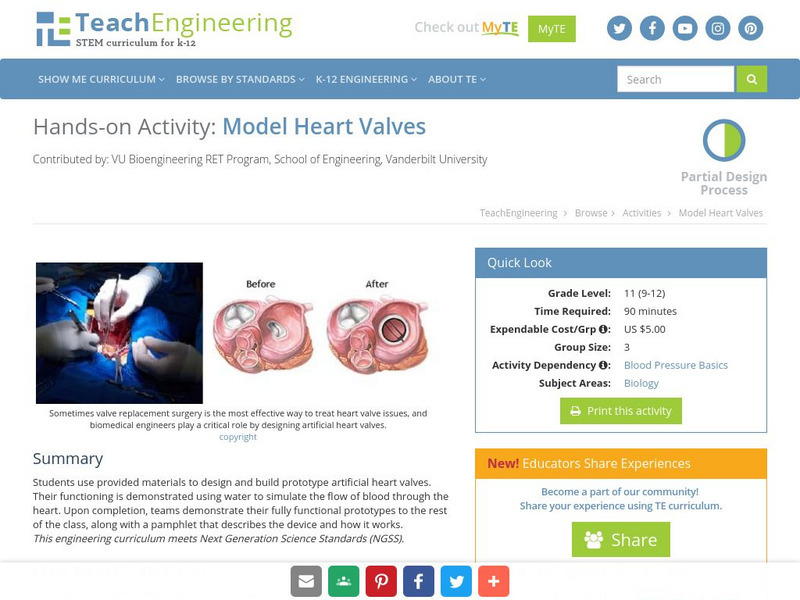TeachEngineering
Teach Engineering: Surgical Device Engineering
This unit focuses on teaching students about the many aspects of biomedical engineering (BME). Students will see that it is a broad field that relies on concepts from each of the other disciplines of engineering. They will also begin to...
TeachEngineering
Teach Engineering: Let the Blood Flow
Students work as biomedical engineers to find liquid solutions that can clear away polyvinyl acetate polymer "blood clots" in model arteries (made of clear, flexible tubing). Teams create samples of the "blood clot" polymer with...
TeachEngineering
Teach Engineering: Using Stress and Strain to Detect Cancer
In this project, students are challenged to answer the question "Is there a way to detect the presence of tumors that isn't as painful as mammography but more reliable and quantifiable than a breast-self exam or clinical breast-exams?"....
TeachEngineering
Teach Engineering: The Heart of Our Cardiovascular System
Students learn about the heart and its role at the center of the human cardiovascular system. In the associated activity, students play out a scenario in which they are biomedical engineers asked to design artificial hearts. They learn...
TeachEngineering
Teach Engineering: Repairing Broken Bones
Students learn about how biomedical engineers aid doctors in repairing severely broken bones. They learn about using pins, plates, rods and screws to repair fractures. They do this by designing, creating and testing their own prototype...
TeachEngineering
Teach Engineering: Glowing Flowers
Student teams learn about engineering design of green fluorescent proteins (GFPs) and their use in medical research, including stem cell research. They simulate the use of GFPs by adding fluorescent dye to water and letting a flower or...
TeachEngineering
Teach Engineering: Engineering the Heart: Heart Valves
Students learn how healthy human heart valves function and the different diseases that can affect heart valves. They also learn about devices and procedures that biomedical engineers have designed to help people with damaged or diseased...
TeachEngineering
Teach Engineering: Protect Those Eyes
Students design and build prototypes for protective eyewear. They choose different activities or sports that require protective eyewear and design a device for that particular use. Students learn about the many ways in which the eyes can...
National Science Foundation
National Science Foundation: Chemistry & Materials: Creating Molecules and Materials by Design
Describes the progress being made in materials engineering, so that one day in the not too distant future scientists will easily be able to use a computer to design materials that meet any required properties.
TeachEngineering
Teach Engineering: Engineer a Sneaker
The goal is for students to understand the basics of engineering that go into the design of a sneaker. The bottom or sole of a sneaker provides support, cushioning, and traction. In addition the sole is flexible and can have some fashion...
TeachEngineering
Teach Engineering: No Valve in Vain
In this activity, students will design and create their own heart valves out of a variety of materials given to them, including: waterproof tape, plastic tubing, flexible plastic sheets, foam sheets, scissors, clay, etc. This activity...
TeachEngineering
Teach Engineering: An Arm and a Leg
Students will design and build a prototype of an artificial limb using a simple syringe system as an introduction to bioengineering. Students will determine which substance water (liquid) or air (gas) will make the appendage more efficient.
TeachEngineering
Teach Engineering: Forced to Fracture
Learners learn how forces affect the human skeletal system through fractures, and why certain bones are more likely to break than others depending on their design and use in the body. They learn how engineers and doctors collaborate to...
TeachEngineering
Teach Engineering: Next Generation Surgical Tools in the Body
Through this unit, students act as engineers who are given the challenge to design laparoscopic surgical tools. After learning about human anatomy and physiology of the abdominopelvic cavity, especially as it applies to laparoscopic...
TeachEngineering
Teach Engineering: Tissue Mechanics
Students reflect on their experiences making silly putty (the previous hands-on activity in the unit), especially why changing the borax concentration alters the mechanical properties of silly putty and how this pertains to tissue...
TeachEngineering
Teach Engineering: Preconditioning Balloons
Students use balloons (a polymer) to explore preconditioning a viscoelastic material behavior that is important to understand when designing biomedical devices. They improve their understanding of preconditioning by measuring the force...
TeachEngineering
Teach Engineering: Building the Neuron
In this activity, students design and build neuron models based on observations made while viewing neurons through a microscope.
TeachEngineering
Teach Engineering: Waves: The Three Color Mystery
Students are presented with a challenge question concerning color blindness and asked to use engineering principles to design devices to help people who are color blind. Using the legacy cycle as a model, this unit is comprised of five...
TeachEngineering
Teach Engineering: Convertible Shoes: Function, Fashion and Design
Students teams design and build shoe prototypes that convert between high heels and athletic shoes. They apply their knowledge about the mechanics of walking and running as well as shoe design (as learned in the associated lesson) to...
TeachEngineering
Teach Engineering: High Arches, Low Arches
A main concern of shoe engineers is creating shoes that provide the right amount of arch support to prevent (or fix) common gait misalignments that lead to injury. During this activity, students look at their own footprints and determine...
TeachEngineering
Teach Engineering: Abdominal Cavity and Laparoscopic Surgery
For students interested in studying biomechanical engineering, especially in the field of surgery, this lesson serves as an anatomy and physiology primer of the abdominopelvic cavity. Students are introduced to the abdominopelvic...
TeachEngineering
Teach Engineering: Presenting Painless Breast Cancer Detection!
This lesson culminates the unit with the Go Public phase of the legacy cycle. In the associated activity, young scholars must depict a tumor amidst healthy body tissue using a graph in Microsoft Excel. In addition, students will design a...
TeachEngineering
Teach Engineering: Measuring Our Muscles
Student teams build model hand dynamometers used to measure grip strengths of people recovering from sports injuries. They use their models to measure how much force their classmates muscles are capable of producing, and analyze the data...
TeachEngineering
Teach Engineering: Model Heart Valves
Students use provided materials to design and build prototype artificial heart valves. Their functioning is demonstrated using water to simulate the flow of blood through the heart. Upon completion, teams demonstrate their fully...









